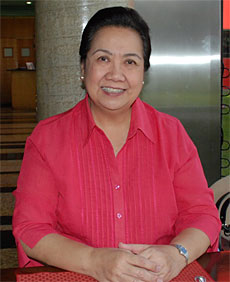BRASILIA: The Philippine Secretary of Social Welfare and Development Esperanza Cabral warned Saudis yesterday that human organs were no longer for sale in the Philippines and that those caught trying to buy them will now face stiff fines and prison sentences.
“The Implementing Rules and Regulations of Republic Act 9208, otherwise known as the Anti-Trafficking in Persons Act of 2003, are now in effect and provide for fines up to P2 million and/or imprisonment of up to 20 years for those caught trying to buy human organs,” she told Arab News in an exclusive interview.
Cabral is currently in Brazil accompanying Philippine President Gloria Macapagal Arroyo, who is on a state visit to the country.
Arroyo arrived on Monday in Recife and met with Brazilian President Luis Inacio “Lula” da Silva in Brasilia on Wednesday.
“I’m sure most Saudis must be aware of this new law by now, but I just wanted to reiterate the ban on the sale of human organs in the Philippines,” said Cabral.
A large number of Saudis needing kidney transplants had regularly visited the Philippines, where poorer Filipinos were willing to sell a kidney for as little as $2,000.
Cabral estimated that up to 800 kidneys were being sold and transplanted every year to various foreigners in the Philippines before the ban was enforced.
“Hospitals, both private and public, were involved in this business, which was lucrative for them as each transplant could cost up to $50,000 to $80,000,” she explained.
The sale of human organs was legal in the Philippines until President Arroyo banned it in 2007. The ban came into effect in March 2008.
The social welfare secretary admitted that the Department of Health was initially reluctant to support the ban of human organ sales, but that she eventually won them over.
“I had a public fight with the health secretary who said that kidney transplants were a humanitarian gesture,” recalled Cabral. “I said ’so why don’t you give your own kidney?’”
“Today the DSWD and the Department of Health are together in the supporting the ban on organ sales,” she said.
Congress urged to institutionalize poverty reduction program
President Arroyo on Wednesday urged the Philippine Congress to institutionalize her poverty reduction program, known as Pantawid Pamilyang Pilipino Program, by passing a law that would establish, regulate and fund it, according to a statement from Malacanang Palace.
The PPPP program was started two years by a presidential administrative order, and is being run by the Department of Social Welfare and Development.
Arroyo made the proposal after attending a presentation of the Bolsa Familia program in Brasilia given by Brazilian Development Minister Patrus Ananias on Wednesday. The Bolsa Familia program originally inspired the Philippine program.
“As you know we have elections next year, so we hope that the next president sees the merits of the program and expands it,” Secretary Cabral said in an interview.
One of the conditions that the families who are enrolled in the program must meet in order for them to receive monthly cash assistance from the government, is that their children attend school at least 85 percent of the time.
Cabral revealed that the PPPP program was advancing well, having already hit its target of enrolling 700,000 families in the conditional cash transfer program six months ahead of schedule.
Meanwhile, the Philippines and Brazil signed five bilateral agreements during Arroyo’s visit. One of the agreements was for technical cooperation in the production and use of biofuels, and another was for cooperation in the field of agriculture.


